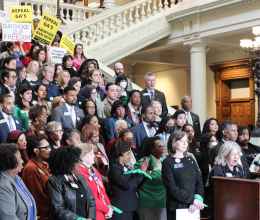New lawsuit filed to block Georgia abortion law in state court after federal challenge lost
Abraham Kenmore | Augusta Chronicle | July 26, 2022

Reproductive rights activists protest the Supreme Court's repeal of Roe v. Wade outside the Augusta Judicial Center on James Brown Boulevard in Augusta, Georgia on June 25, 2022. Miguel Legoas/The Augusta Chronicle
Organizations providing reproductive health services in Georgia on Tuesday filed a lawsuit in Fulton County Superior Court challenging Georgia's 2019 abortion law under the state constitution.
Last week, a federal appeals court ruled that the law, which bans abortion after six weeks of pregnancy, was legal under federal law and ordered it to take immediate effect.
"Forcing women to carry a pregnancy against their will has many life-altering consequences," said Andrea Young, executive director of the ACLU in Georgia, during a news conference held Tuesday. "Gov. (Brian) Kemp's abortion ban must be stopped."
With injunction reversed, court says 'heartbeat' abortion law takes immediate effect.
Abortion access groups, state attorney general files briefs on Georgia abortion law.
The lawsuit was brought by the ACLU of Georgia on behalf of several plaintiffs, including the lead plaintiff, SisterSong Women of Color Reproductive Justice Collective. Many of the plaintiffs are the same as those who sued in federal courts to stop the statewide ban.
"We have been in this fight since the very beginning, and today we are sending a very clear message: We are not giving up. This work must continue to ensure that Georgians are able to live in a state where they are able to make their own decisions about their own lives and their own future," said Monica Simpson, executive director of SisterSong.
The lawsuit names the State of Georgia as the defendant.
“We are currently reviewing this filing and we will uphold our constitutional duty, as we do with all lawsuits against the state," wrote Kara Richardson, spokeswoman for Attorney General Chris Carr's office, in a statement.
State law arguments
The lawsuit argues that because the abortion ban, also known as the "heartbeat bill," was illegal when enacted under Roe v. Wade, it continues to be illegal and would need to be re-enacted by the state legislature. They also argue that it violates state constitutional guarantees of liberty and privacy, as well as equal protection.
These arguments are rooted in legal precedent over the Georgia state Constitution, not the U.S. constitution, according to Julia Kaye, staff attorney with the ACLU Reproductive Freedom Project.
"This lawsuit is grounded in more than a century of Georgia Supreme Court precedent establishing that the Georgia constitution is highly protective of an individual's right to be free of political interference with their body, health and life," Kaye said.
Kaye also said laws that violate the constitution when passed cannot be enforced even if courts later change their rulings.
The plaintiffs have requested a hearing on Aug. 2.
"Since taking effect on July 20 and prohibiting most abortions in Georgia, the Six-Week Ban has already caused irreparable harm — with more devastation promised every day it is in effect," the lawsuit reads. "Already, Plaintiffs (who include abortion providers) have had to send patients home from waiting rooms in tears and cancel hundreds of upcoming appointments — with some patients forced to travel hundreds or thousands of miles out of state at great cost, and others desperately pleading that if they cannot get an abortion past six weeks in Georgia, they will not be able to get one at all."
The law at stake
In 2019, the Georgia General Assembly passed the heartbeat law that banned most abortions after about six weeks. Georgia law previously allowed abortions within 20 weeks of gestation.
Rape and incest are exceptions to the law, as long as a police report is filed, in addition to later abortions when the pregnant person’s life is at risk or a serious medical condition renders a fetus unviable.
After SisterSong sued to block the bill in federal court, a federal district court judge sided with the organizaiton. When the state appealed the case to the 11th Circuit, the appeals court waited on giving an opinion until the U.S. Supreme Court could deliver its opinion in Dobbs v. Jackson.
The 11th Circuit issued an opinion on July 20 vacating the lower court injunction.
Related content
Georgia Supreme Court Allows Six-Week Abortion Ban to Remain in...
October 24, 2023
Press Statement: The ACLU of Georgia responds to Appeals Court...
August 18, 2023
Reflecting on the Impact of Dobbs Ruling a Year Later
June 27, 2023
Andrea Young Honored With Lifetime Achievement Award For...
January 27, 2023
Ga. House And Senate Members Introduce Bills To Repeal The State’s...
January 25, 2023
Get Involved In The 2023 Legislative Session: Lobby Day And Capitol...
January 23, 2023
The Best Decision: How Abortion Changed These Lives for the Better
January 11, 2023